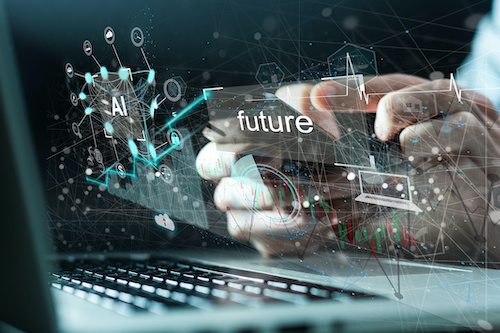Key points:
- Artificial intelligence won’t replace educators–but it can enhance their abilities
- AI in education has the potential to streamline tasks across the board to improve workflows
- See related article: Embracing AI for limitless learning potential
- Everything You Need To Know About AI In Education
In the past year, AI has become the shiny new technology across industry sectors. In fact, in education specifically, AI has the potential to revolutionize the way teachers can support students and their individual journeys. But the problem with AI today is the misunderstanding of its potential–especially when it comes to AI in education.
AI in education isn’t about replacing human educators, and it certainly doesn’t mean that students are off the hook with AI-written essays and assignments. Educators and administrators need to understand the power of AI and how it can–and will–open once-closed doors not only for students, but also for school staff in supporting their students’ journeys and their futures.
Enhanced administrative efficiency
On average, teachers spend 54 percent of their time managing administrative tasks and grading, leaving less than half of their time to actually teach. Traditionally, districts have tossed their staff tool after tool in an effort to help. While an astronomical average of 1,417 edtech tools and applications are being used in U.S. school systems, the core issue faced by teachers is overlooked–data overload.
Teachers don’t need more edtech tools or data to manage; they need easy access to actionable data from all systems to improve their day-to-day life so they can spend more time teaching.
With many school districts and individual campuses facing teacher shortages and overworked staff, AI in education has the potential to streamline tasks across the board to improve workflows.
AI-powered tools can automate administrative duties such as grading assignments or managing schedules, allowing teachers to focus more on instruction and give students more support. Similarly, AI-driven data analysis tools give educators insights that help in identifying learning gaps and tailor their instruction accordingly.
AI-enabled education ecosystems
While AI enhances student engagement and frees up teacher time by automating basic tasks like grading and real-time feedback, one of the key advantages of incorporating AI in education is its ability to enhance the holistic learning experience for students by equipping teachers with data that can serve students’ individual needs.
Most tools used in schools today are designed to manage students’ academic achievements, but often overlook the holistic development of every child. AI-powered educational management systems allow educators to see deeper into student success, far past number grades and surface-level pass/fail assessments. They have the power to bring forth more meaningful data, along with students’ unique talents, capabilities, and aspirations based on the data within the system. Some AI tools even allow teachers to ask specific questions and prompt the AI to populate a student-skill-specific narrative to see through the numbers and truly understand the student at a holistic level. With AI-powered educational management systems, educators can tailor instruction and a holistic learning experience based on each student and their individual needs.
Designing a pathway to help students feel seen
The promise of AI in education lies in its ability to help schools document and manage the personal development of every student. By being able to track and monitor student data including real-time performance, interests, involvement, unique capabilities, and special skills, AI has the power to create a more equitable learning environment by providing opportunities that fall in line with each student’s unique data.
With personalized support and adaptive learning experiences, AI can address the individual learning needs of diverse students. This inclusionary approach ensures that every student receives the necessary resources they need to succeed in the classroom and afterwards. What’s more, AI can give students the joy of being seen, valued, and acknowledged for their unique talents and capabilities. “Doing well” and “being seen” are not always synonymous in our school system, and AI is able to unlock what is behind arbitrary grading structures and uncover each student’s unique skill set.
The future of AI in education holds great promise for teachers, students, and the larger educational ecosystem. From personalized learning experiences to improved administrative efficiency, AI has the potential to transform traditional educational practices and create a more inclusive learning environment. By harnessing the power of AI responsibly, the current system can unlock new possibilities for education that benefit all learners and their support systems.
Related:
4 exciting ways AI is a game-changer for teachers
Education in the age of AI and smart technology
- 4 ways to encourage play in education - April 25, 2024
- CoSN IT Leader Spotlight: Lisa Higgins - April 25, 2024
- It’s time to pay student teachers - April 25, 2024

